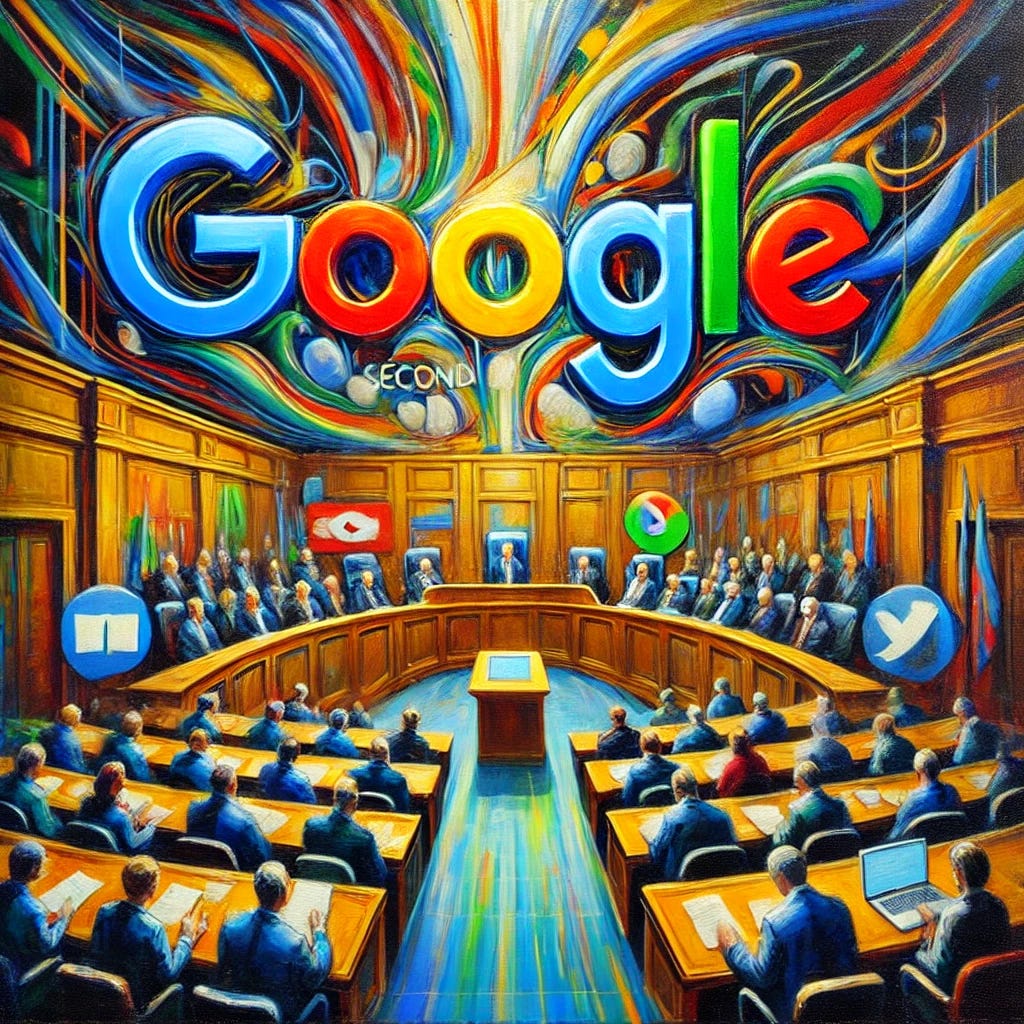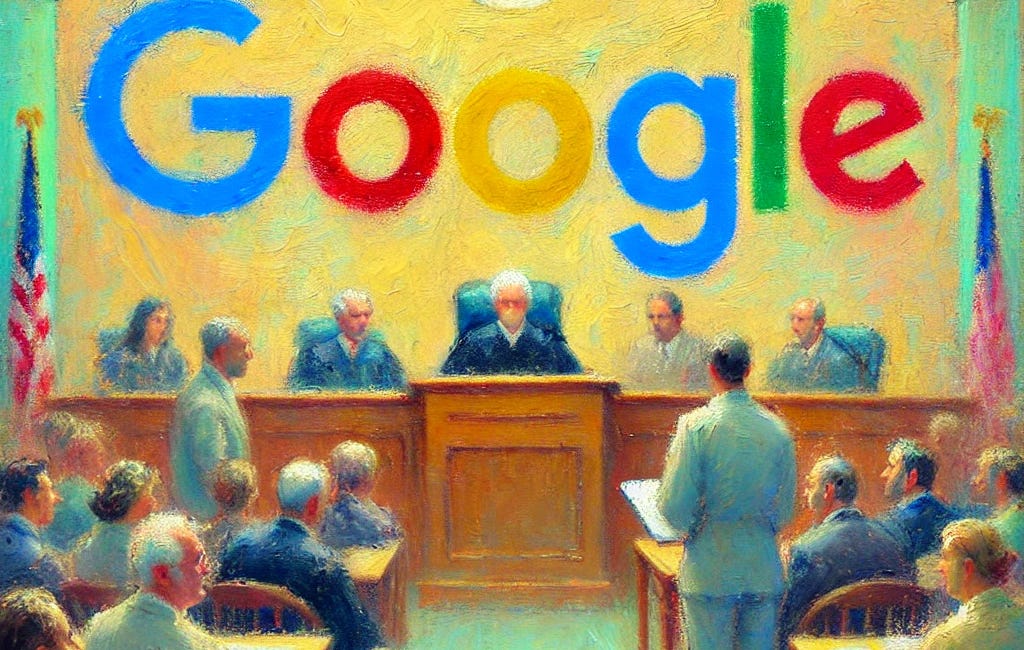Google’s Second Antitrust Trial Commences Today
A Defining Moment for Online Advertising and Tech Regulation.
The Legal Battle that Could Reshape the Online Ads
Google, one of the world’s biggest and most dominant tech companies, is facing its second major antitrust trial in the U.S., this time centered on its advertising business. The Department of Justice (DOJ) and a coalition of states argue that Google has built an illegal monopoly over the technology connecting publishers and advertisers, which has stifled competition and led to inflated ad prices. This case could reshape the online ad industry and serve as a broader test for antitrust actions against Big Tech.
The DOJ contends that Google’s control over both the buy and sell sides of the ad market allows it to retain up to 36% of ad revenue in transactions. Google, however, dismisses the claims as outdated, arguing that the online ad space has diversified, with newer platforms like TikTok and streaming services gaining prominence. The trial commencing today, set in Alexandria, Virginia, could have wide-reaching implications for the company and the future of digital advertising.
The Road to the Second Trial: A String of Antitrust Actions
Google’s second antitrust trial comes on the heels of a landmark defeat in another case brought by the DOJ. In August, a federal judge ruled that Google held an illegal monopoly in the internet search market. This marked the largest antitrust victory against a tech company in over two decades, drawing parallels to the 1998 case against Microsoft. However, the stakes are arguably higher this time around, as this case delves into Google’s advertising business, a $200 billion empire that underpins much of the internet's commercial ecosystem.
The DOJ first initiated its antitrust campaign against Google in 2020, under the Trump administration, accusing the company of maintaining illegal monopolies across multiple sectors, including search and advertising. Although antitrust scrutiny of Big Tech has intensified in recent years, Google is the only company among its peers, such as Meta, Amazon, and Apple, to face a full-fledged federal trial so far. This trial represents not only a challenge to Google’s business model but also a broader effort by U.S. regulators to curb the growing dominance of tech giants.
DOJ's Case: How Google Allegedly Built a Monopoly in Digital Ads
At the heart of the DOJ’s case is the claim that Google used its market power to stifle competition and inflate prices in the digital advertising market. According to prosecutors, Google controls nearly every aspect of the ad tech stack, including buying ads, selling ads, and running an ad exchange. This dominance, the DOJ argues, has created insurmountable barriers for competitors and led to higher costs for advertisers, while simultaneously squeezing the revenue of publishers.
Unpacking Google's Alleged Anti-Competitive Behaviour
The DOJ is focusing on Google’s dominance through acquisitions, particularly its 2008 purchase of DoubleClick, a company that revolutionised digital ad targeting. By integrating DoubleClick’s technology into its own ad tech stack, Google gained control over both the demand and supply sides of the online ad market. According to the DOJ, this allowed Google to require publishers and advertisers to use its full suite of tools, locking them out of rival ad platforms. Such tactics, the DOJ contends, violate Sections 1 and 2 of the Sherman Antitrust Act, which prohibit anti-competitive conduct and monopolisation.
The DOJ further alleges that Google has used its monopoly to increase ad prices while reducing the share of revenue that publishers receive. This, in turn, has forced many publishers to find alternative business models, such as subscriptions, or, in some cases, shut down altogether due to insufficient ad revenue. The agency has enlisted several states, including California, New York, and Colorado, in its case, highlighting the widespread concern over Google’s practices.

Google’s Defence: A Competitive Market, Innovation, and Consumer Choice
Google, on the other hand, staunchly denies the DOJ’s accusations, arguing that the digital advertising market remains highly competitive and that its ad tools provide critical value to both advertisers and publishers. The company is expected to argue that the DOJ is mischaracterising the dynamics of the online ad space and that numerous competitors, including Meta, Amazon, and Microsoft, offer alternative advertising platforms.
Google’s Counterargument: Innovation, Efficiency, and Consumer Benefits
Google is likely to frame its acquisitions of DoubleClick and other companies as necessary steps that fostered innovation in a rapidly evolving digital ecosystem. At the time of these acquisitions, the deals were approved by regulators, and Google will argue that they were not viewed as “killer acquisitions.” Instead, Google contends that its tools have made online advertising more efficient by automating ad placements, improving targeting, and handling billions of ad auctions daily.
The company will also push back on the notion that it dominates the market, pointing out that it operates in a fragmented industry with multiple players. Google has long argued that its ad prices are competitive and that its platform allows small businesses to advertise online effectively. Google will likely claim that breaking up its ad business, as the DOJ seeks, would disrupt a well-functioning system and slow innovation, making it harder for publishers and small businesses to reach consumers.
What’s at Stake: The Potential for a Breakup and Widespread Litigation
The outcome of this trial could have profound implications for Google’s business and the broader tech landscape. If the DOJ succeeds, it may result in the divestiture of key parts of Google’s advertising empire, particularly the Google Ad Manager (GAM) suite, which facilitates ad sales for publishers. This would not only weaken Google’s dominance but also reshape the entire digital advertising market, opening the door for more competition.
Financial Fallout: Billions in Potential Lawsuits
Moreover, the consequences of a ruling against Google could extend beyond divestitures. Industry experts predict a wave of lawsuits from advertisers who could claim damages for inflated ad prices. Analysts from Bernstein have estimated that Google could face up to $100 billion in damages from such litigation. This would represent a financial blow of historic proportions, potentially eclipsing even the fines levied against other tech giants in recent years.
Broader Implications: A Precedent for Regulating Big Tech
Beyond the immediate impact on Google, this trial is seen as a crucial moment for the future of antitrust enforcement in the U.S. and around the world. For years, regulators have struggled to rein in the power of Big Tech, and this case could serve as a model for future actions against companies like Amazon, Meta, and Apple. A ruling in favour of the DOJ would send a clear message that monopolistic behaviour in the digital age will not be tolerated, potentially leading to increased regulatory scrutiny of other tech firms.
The Global Ripple Effect
The significance of this trial is not limited to the U.S. The European Union has already taken a hard stance on Big Tech, and a ruling against Google in the U.S. could embolden regulators around the world to pursue similar actions. In particular, the EU’s Digital Markets Act (DMA) aims to curtail the dominance of companies like Google by enforcing rules designed to promote fair competition in digital markets. A U.S. ruling could bolster such efforts, leading to more stringent regulation of tech companies globally.
In Summary: The Trial that Could Redefine Digital Advertising and Tech Regulation
Google’s second antitrust trial is not just a battle over digital advertising; it represents a defining moment for the tech industry and its future regulation. As the DOJ seeks to dismantle what it sees as a monopolistic empire, Google is fighting to maintain its role as the dominant player in the digital ad market. The trial’s outcome could reshape the landscape of online advertising, introduce new competitive pressures, and set the tone for future antitrust actions against Big Tech. With billions of dollars and the future of the digital economy at stake, this case promises to be a watershed moment in the ongoing struggle to regulate the power of technology giants1.
Google Found Guilty in Federal Antitrust Lawsuit Filed by US Department of Justice
Google Antitrust Verdict: A Tectonic Rift in the Tech Industry



